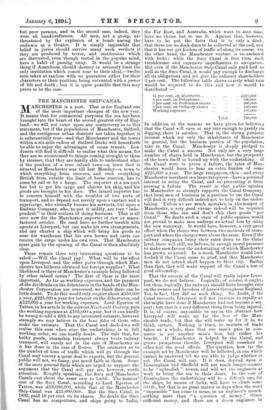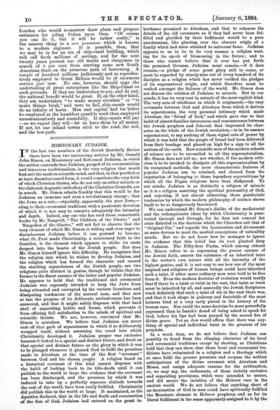THE MANCHESTER SHIP-CANAL.
MANCHESTER is a port. That is for England one of the most important changes of the new year.
It means that for commercial purposes the sea has been brought into the heart of the second greatest city of Eng- land—we will not enter upon any controversy as to this statement, but if the populations of Manchester, Salford, and the contiguous urban districts are taken together, it is substantially true—and that Manchester and the towns within a six-mile radius of Salford Docks will henceforth be able to enjoy the advantages of ocean transit. Lon- doners will find it difficult to realise what this means, for they are so accustomed to things coming straight to them by steamer, that they are hardly able to understand what is the position of a true inland town—a town that is situated as Manchester was till last Monday—a town to which everything from over-sea, and even everything British from outside the limit of horse traction, has to come by rail or by a barge. The importer at a sea-port has but to get his cargo and charter his ship, and his goods are brought to his door. The inland importer has to concern himself with the troubles of two sorts of transport, and to depend not merely upon a captain and a supercargo, who virtually become his servants, but upon a Railway Company, who, to put it mildly, are very " inde- pendent " in their notions of doing business. That is all over now for the Manchester importer of raw or manu- factured articles. He need have no further trouble with agents at Liverpool, but can make his own arrangements, and can charter a ship which will bring his goods so near his warehouse that his own horses and carts can receive the cargo under his own eyes. That Manchester must gain by the opening of the Canal is then absolutely clear.
There remain three very interesting questions to be asked :—Will the Canal pay ? What will be the effect upon Liverpool and the other ports through which Man- chester has hitherto obtained her foreign supplies ? What likelihood is there of Manchester's example being followed by other inland towns ? The first of these is the most important. As far as working expenses, and the payment of the dividends on the debentures in the hands of the Man- chester Corporation are concerned, we think there can be little doubt. To do this would only require about £350,000 a year, £225,000 a year for interest on the debentures, and £125,000 a year for working expenses. Lord Egerton of Tatton, in his article in the current Nineteenth Century, puts the working expenses at £105,000 a year, but it can hardly be wrong to add a fifth to any interested estimate, however strongly we may believe in the bona fides of those who make the estimate. That the Canal and dock-dues will realise this sum when once the undertaking is in full working order, we can hardly doubt. The rule that, for bulky goods, steamship transport always beats railway transport, will surely act in the case of Manchester as it has done in the case of Rouen. The estimates as to the number of tons of traffic which will go through the Canal may convey a great deal to experts, but the general public will not, we fancy, put much faith in them. Some of the more general facts which are urged to support the argument that the Canal will pay are, however, worth attention. Roughly speaking, the Suez and Manchester Canals cost about the same sum to build. The nominal cost of the Suez Canal, according to Lord Egerton of Tatton, was X18,000,000, while that of the Manchester Ship-Canal was X15,000,000. But the Suez Canal, in 1892, paid 18 per cent. on its shares. No doubt the Suez Canal has no Competitors, and ships going to India, the Far East, and Australia, which want to save time, have no choice but to use it. Against that, however, have to be put the facts that it is only a ditch,. that there are no dock-dues to be collected at the end, and that it has not got feeders of traffic all along its course. On the other hand, the Manchester venture is encumbered with locks ; while the Suez Canal is free from such troublesome and expensive impediments to navigation. But even if the Manchester Ship-Canal only paid half as well as the Suez Canal, it would pay enough to discharge all its obligations and yet give the ordinary shareholders 3 per cent. The following table shows exactly what sum would be required to do this and how it would be distributed :- 41 per cent. on £5,000,000... . £225,000
4 per cent. on Debentures ... ... 100,000 5 per cent. on Preference shares . . ... 200,000 3 per cent. on Ordinary shares ... ... 120,000 Working expenses ... ... 105,000 Total . 745,000
In addition to the reasons we have given for believing that the Canal will earn at any rate enough to justify its digging, there is another. That is, the strong patriotic interest which not only the inhabitants of Manchester in general, but the business portion of the population, take in the Canal. Manchester is deeply pledged to make the Canal a success. Not only are a very large number of shares held in Manchester, but the prosperity of the town itself is bound up with the undertaking. If the Canal were to prove a failure, the rates of Man- chester would have to bear an extra burden of some X225,000 a year. The large ratepayers, then—and every Manchester merchant is a large ratepayer—have a personal interest in using the Canal, and so preventing it from proving a failure. The result is that public opinion in Manchester so strongly supports the Canal Company, that local men of business in a position to use the Canal will find it very difficult indeed not to help on the under- taking. -Unless we are much mistaken in the temper of Manchester, a very good excuse indeed will be required from those who can and don't ship their goods " per Canal." No doubt such a state of public opinion would not prevail to make men undergo an actual loss by using the new waterway. It would have, however, a very great effect when the choice was between two methods of trans- port and where the charges were about the same. Even if the railway companies bring their rates down to the Canal level, there will still, we believe, be enough moral pressure to make men favour the undertaking of which Manchester has grown so proud. In a word, Manchester would look foolish if the Canal came to grief, and that Manchester men do not intend shall happen to their city. Rather than that, they will make support of the Canal a test of good citizenship.
That the success of the Canal will really injure Liver- pool, we do not believe. Logically, of course, it ought ; but then, logically, the railways should have brought ruin on the owners and breeders of horses throughout England. Yet, in fact, they did no such thing. No doubt, if the Canal succeeds, Liverpool will not increase so rapidly as she might have done if Manchester had not become a sea- port ; but that is a very different thing from being injured. It is, of course, impossible to say in the abstract how Liverpool will make up for the loss of the Man- chester trade, but that she will make up for it is, we think, certain. Nothing is truer, in matters of trade taken as a whole, than that one man's gain in com- merce is not another man's loss, but rather his benefit. If Manchester is helped by the Canal, and grows prosperous thereby, Liverpool will somehow or other feel the good effects. The question, how far the example set by Manchester will be followed, is one which cannot be answered till we are able to judge whether or not the Canal will pay. If it does, depend upon it Birmingham and Sheffield will not much longer consent to be " uplandish " towns, and will set the engineers at work to bring the sea to their doors. In the case of Birmingham the undertaking will be a difficult one, for the ships, by means of locks, will have to climb some 500 ft., but that is no great matter in days when the word " impossible " has come to mean, in an engineer's mouth, nothing more than " a question of money." Given sufficient money, and there are a dozen engineers in
London who would to-morrow draw plans and prepare estimates for piling Pelion upon Ossa. " Of course you can do it, but it will be rather costly," is the nearest thing to a non possumus which is known to a modern engineer. It is possible, then, that we may be in for an era of ship-canal building, which will call forth millions of savings, and for the next twenty years prevent our old maids and clergymen in search of 6 per cent. from starting some new South American State on the primrose path of borrowing. A couple of hundred millions judiciously and so reproduc- tively employed in Great Britain would be of enormous service just now. No one, however, should urge the undertaking of great enterprises like the Ship-Canal on such grounds. If they are undertaken to pay, and do pay, the national benefit would be great. If, on the other hand, they are undertaken " to make money circulate " or " to make things brisk," and were to fail, ship-canals would do an infinity of harm. Men and capital had far better be employed at the humblest possible work than employed unremuneratively and wastefully. If ship-canals will pay —as we expect they will—let us have them by all means. If not, let our inland towns stick to the road, the rail, and the tow-path.











































 Previous page
Previous page